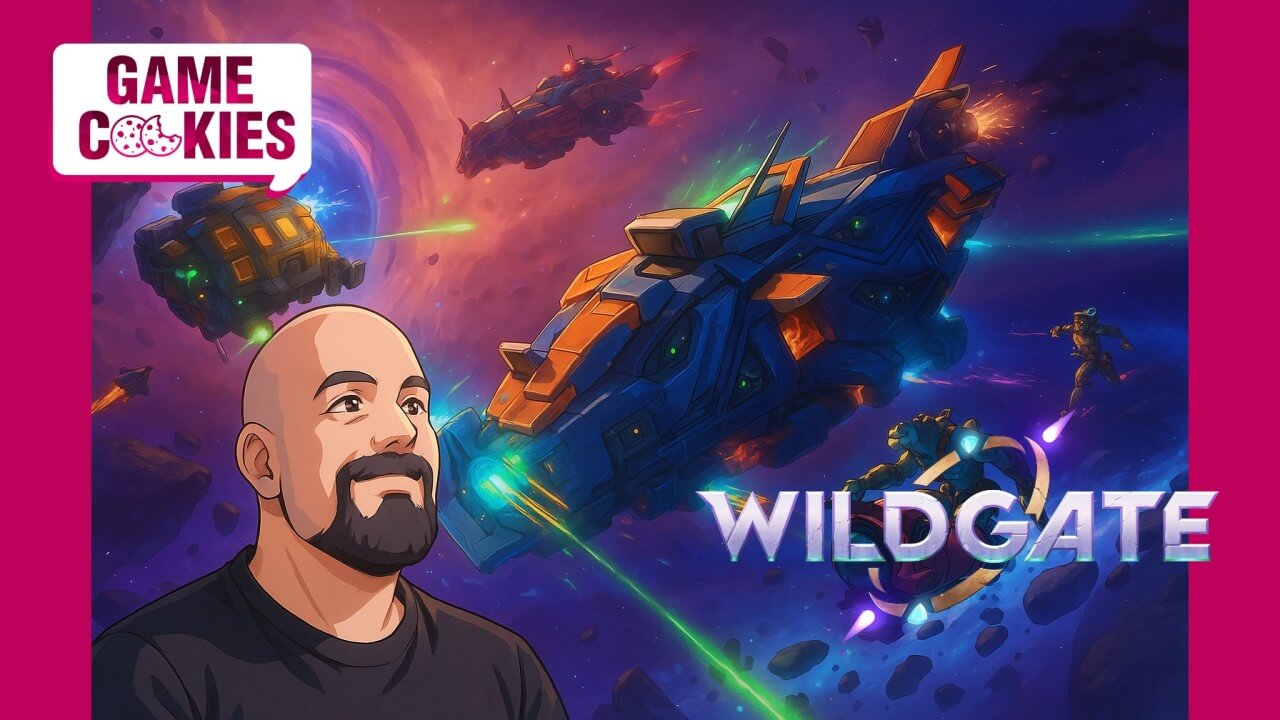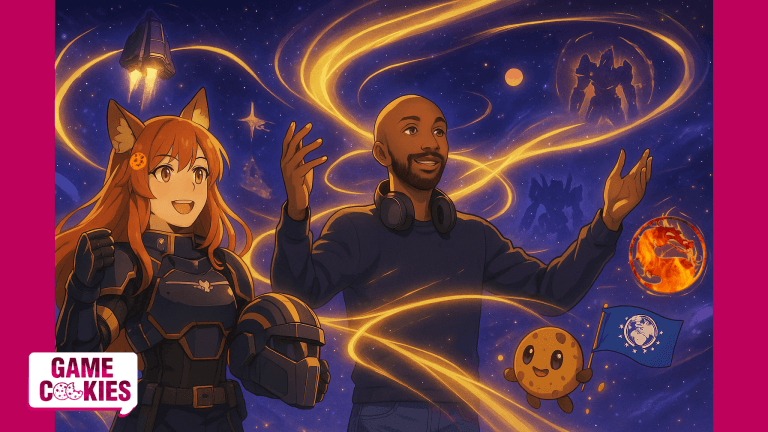
🍪 Game Cookies Dialogz: Dustin Browder — Designing Wildgate’s Beautiful Chaos
Hello there, explorers of the edge and engineers of entropy! Today we bring you an exclusive interview with Dustin Browder, legendary designer (StarCraft II, Command & Conquer, Heroes of the Storm) and now co-founder at Moonshot Games. His latest project, Wildgate, published by Dreamhaven is a tactical hybrid of ship combat, FPS intensity, procedural chaos, and tight co-op teamwork.
It’s not just ambitious — it’s deeply thoughtful, brutally iterative, and grounded in decades of design wisdom. Here’s what we learned about its development, philosophy, and the surprising inspirations that make Wildgate tick.
🍪 Designing a Game That Shouldn’t Work — But Does
Mashing genres is risky, but Browder and his team have embraced the chaos with intention. Wildgate blends cooperative FPS combat with PvP ship battles — with each ship acting like its own level.
“We were inspired by many games, including Sea of Thieves, Guns of Icarus, Apex Legends, Subnautica, and Overcooked… Our ships are particularly difficult to build — they are flying PvP and Cooperative first-person shooter levels.”
This hybrid structure introduces wild technical and artistic challenges: ships need to look great inside and out, and support multiple play styles simultaneously.
🥠 Out take: Few games attempt to make their vehicles into full-fledged characters — let alone transform them into modular PvP arenas. It’s bold, chaotic, and surprisingly elegant.
🍪 Why Every Role in Wildgate Feels Like a New Game
Instead of a one-size-fits-all experience, Wildgate constantly shifts its tempo — demanding players engage different parts of their brain for piloting, boarding, or gunnery.
“Boarding is a very fast, rapid decision-making process while piloting is far slower and more strategic… Our hope is that the different skills required of players challenge them to think about the game in very different ways.”
These role-specific shifts force players into distinct cognitive modes — a design decision strengthened by years of playtesting.
“We’ve been playtesting between two and three times a week since 2020… All of this helped us find a direction.”
🥠 Out take: It’s not just about switching weapons — it’s about switching mental frameworks. Few PvP games offer this level of multidimensional challenge.
🍪 Progression as Expression — Not Grind
Progression in Wildgate isn’t about power creep — it’s about creating a sense of identity. Players combine Prospectors, loadouts, and ships to tailor their own combat philosophy.
“Your ability to combine a different Prospector with different weapons and equipment allows players to mix and match… Progression also unlocks additional ships… Bastion, Privateer, Scout — each supports a different style.”
🥠 Out take: Customization is built to empower — not overwhelm. You’re not just unlocking stats; you’re defining your role in a chaotic ecosystem.
🍪 Procedural Maps, Human-Centric Design
Wildgate’s maps are procedural, but Browder is clear: the team hasn’t nailed it yet. Instead of pretending otherwise, they embrace procedural generation as a space for creative struggle.
“How to make something random(ish) that is a fun play experience…? We’ll let you know when we have the perfect answer. In the meantime, we’ll keep trying things.”
🥠 Out take: This isn’t procedural generation for the sake of it — it’s about creating surprise that feels intentional. That kind of humility in design is rare.
🍪 When Your Community Teaches You Your Own Game
Early playtesters took Wildgate in directions the team didn’t expect — especially in terms of player aggression. That feedback shaped big design pivots.
“Early notes encouraged us to buff our Prospectors… We made several major changes to slow down aggression and buy more breathing room, especially in the early game.”
It’s a powerful reminder that community insight doesn’t just polish a game — it rewrites its core.
🥠 Out take: The best teams don’t double down when surprised by player behavior — they adapt. That’s what separates iteration from stubbornness.
🍪 How to Survive a Bold Game Development Process
We asked Browder what advice he’d give to teams attempting a similar genre mashup. His response: stay small, test constantly, and prioritize team health.
“Keep your team as small as possible… Playtest like crazy. Listen to one another and your community. Make the health and well-being of your team a very high priority.”
🥠 Out take: Creativity without sustainability burns out fast. Wildgate is what happens when ambition is tempered by structure and care.
🍪 Teaching a New Language of Play
Wildgate has no traditional genre blueprint. Teaching it meant designing multiple entry points — tutorials, AI modes, a Firing Range — and then refining them over time.
“The game has a lot of elements… We are always open to feedback on this area and are constantly learning ourselves.”
🥠 Out take: Teaching isn’t a one-time UX pass — it’s an evolving relationship with your players. Especially when the game is this different.
🍪 A PvP Game with a Narrative Spine
Most PvP games chase replayability with randomness. Wildgate adds structure. Every match is a 3-act arc — with frequent surprises to avoid predictability.
“Act 1: loot a small location. Act 2: loot a medium location. Act 3: battle enemy ships… Then break the structure fairly often or it becomes repetitive.”
Browder’s tabletop roots show here — he cites Necromunda as a design touchstone for combining story with brutal tactics.
🥠 Out take: This isn’t a PvP shooter — it’s a co-authored narrative generator that adapts to player choices and breaks its own rhythm when needed.
🍪 Moments That Made It All Real We asked for the biggest “aha!” during development — and Browder gave us a series of emotional breakthroughs.
“When ships first flew. When we first heard the main music theme. When we made the switch to Unreal 5. When we saw our first trailer. When we finished our first spaceship.”
“The Laser Ram and Tractor Beam both fundamentally changed the play space… Every member of the team had a moment where they thought ‘wow, this is really happening.’”
🥠 Out take: Game dev is grueling — but these moments of magic are why teams keep going. They’re fuel, not just features.
🍪 Ready to Play? We Are.
It’s the final countdown: revealed at Summer Game Fest, Dreamhaven™ studio Moonshot Games™ officially announced that Wildgate blasts off on July 22 for Steam, Xbox Series X|S, and PlayStation®5.
In just a few short weeks, Prospectors from across the galaxy will enter the Reach in search of fortune, fame — and, most importantly, fun.
👉 🎮 Wishlist Wildgate on Steam
We’re definitely jumping in on launch day — and we hope to see you out there in the Reach.
Stay modular like a warship interior, keep nimble like a boarding party, and remember: the weirdest design ideas often build the best games.
🍪 Don’t forget to share this post and click the bell
🔔 Stay updated with more Game Cookies Dialogz interviews and design deep dives.







